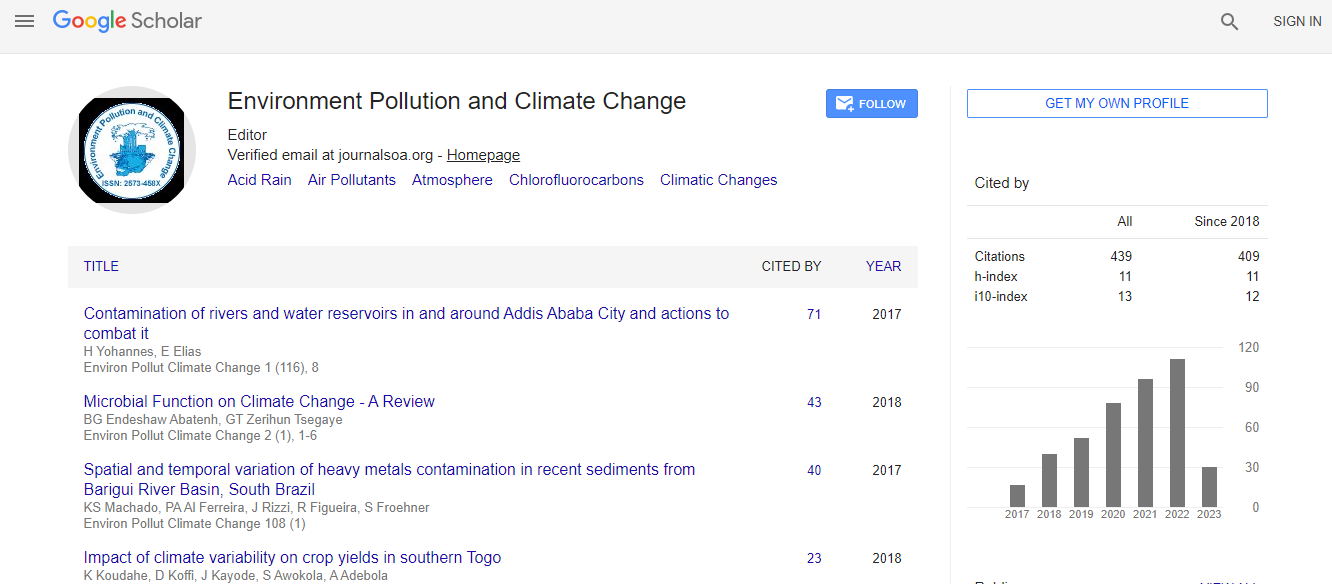Our Group organises 3000+ Global Conferenceseries Events every year across USA, Europe & Asia with support from 1000 more scientific Societies and Publishes 700+ Open Access Journals which contains over 50000 eminent personalities, reputed scientists as editorial board members.
Open Access Journals gaining more Readers and Citations
700 Journals and 15,000,000 Readers Each Journal is getting 25,000+ Readers
Google Scholar citation report
Citations : 672
Environment Pollution and Climate Change received 672 citations as per Google Scholar report
Environment Pollution and Climate Change peer review process verified at publons
Indexed In
- Google Scholar
- Publons
- Euro Pub
- ICMJE
Useful Links
Recommended Journals
Share This Page
Health risk assessment of chemical pollutants in an automobile manufacturing, Iran
Joint Event on 5th World Conference on Climate Change & 16th Annual Meeting on Environmental Toxicology and Biological Systems
Seyed Jamaleddin Shahtaheri, Bahram Harati, Ali Karimi and Kamal Azam
Tehran University of Medical Sciences, Iran
Posters & Accepted Abstracts: Environ Pollut Climate Change
Abstract
Background: In recent years, many national and international expert groups have considered specific improvements in risk assessment of chemical pollutants. This study has considered to assess the risk of workers exposed to the air pollutants followed by inhalation exposure in an automobile manufacturing in Iran. Methods: A cross-sectional research was done in. Methods number 1501 and 7602 of the National Institute of occupational safety and Health (NIOSH) were used for sampling and analysis of compounds BTEX and silica in the air. A total of 40 samples of compound BTEX were taken and analyzed by Gas Chromatography-Flame Ionization Detector (GC-FID). A total of 6 samples of silica were collected during the campaign. Silica analyses were performed by using visible spectrophotometry. Risk ranking was calculated using the hazard and exposure rate. Finally, the relative risk of blood cancer caused by exposure to benzene was estimated. Results: The result demonstrated that, workers were exposed to 5 chemicals including silica, benzene, toluene, ethyl-benzene, and xylene during their work in manufactory. Among the pollutants in the breathing zone of workers, silica and benzene were hazardous chemicals at high risk level. Following the estimation of relative risk of blood cancer caused by exposure to benzene, workers cumulative exposure to benzene was obtained to be 23.1 ppm per year and the capture relative risk was 1.1. The significant relationships were also seen between the workers exposed to benzene in both age and work experience, so that, degree of exposure decreased steadily with increasing age and experience (P<0.001). Conclusions: This research demonstrated that, benzene and silica had the highest exposure risk in the automobile manufacturing. Also, painting hall workers were directly exposed to benzene possibly increase the blood cancer risk. Therefore, an essential education and occupational protection programs needed to be considered in order to reduce risk assessment associated with the chemicals in industries like automobile manufacturing. Recent Publications 1. Khadem M, Faridbod F, Norouzi P, Rahimi Foroushani A, Ganjali MR, Shahtaheri SJ, Yarahmadi R. (2017).Modification of carbon paste electrode basec on molecularly imprinted polymer for electrochemical determination of diazinon in biological and environmental samples, Electro analysis, Vol. 29, 708-715. 2. Khadem M, Faridbod F, Norouzi P, Rahimi Foroushani A, Ganjali MR, Shahtaheri SJ, Yarahmadi R. Design and synthesis of a highly selective electrochemical sensor for occupational monitoring of diazinone, Journal of Health and Safety at Work, Vol. 7, No. 1, 9-23. 3. Harati B, Shahtaheri SJ, Karimi A, Azam K. (2017). Evaluation of health risk assessment of occupational exposure to chemical pollutant in an automobile manufacturing industry, Journal of Health and Safety at Work, Vol. 7, No. 2, 121-131. 4. Ghahri A, Golbabaei F, Vafajoo L, Mireskandari SM, Yaseri M, Shahtaheri SJ (2017). Removal of Greenhouse Gas (N2O) by Catalytic Decomposition on Natural Clinoptilolite Zeolites Impregnated with Cobalt. International Journal of Environmental Research, Vol. 11, No. 3, 327-337. 5. Kakavandi NR, Ezoddin M, Abdi K, Ghazi-Khansari M, Amini M, Shahtaheri SJ (2017). Ion pair-switchable-hydrophilicity solvent based homogeneous liquid-liquid microextraction for the determination of paraquat in environmental and biological samples prior to high-performance liquid chromatography, Journal of Separation Science, Vol. 40, 3703-3709.Biography
Seyed Jamaleddin Shahtaheri completed his PhD from Surrey University, Guildford, England in 1996. He is an Academic Member of the Department of Occupational Health Engineering, Tehran University of Medical Sciences, Iran, acting as the Dean Research Deputy at the Institute for Environmental Research at the same university. He is a Member of the Persistent Organic Pollutant Review Committee (POPRC) under the Stockholm Convention, UNEP, UN. He has published more than 150 papers in reputed journals and has been serving as an Editorial Board Member of seven national and international journals.
E-mail: shahtaheri@tums.ac.ir

 Spanish
Spanish  Chinese
Chinese  Russian
Russian  German
German  French
French  Japanese
Japanese  Portuguese
Portuguese  Hindi
Hindi 
